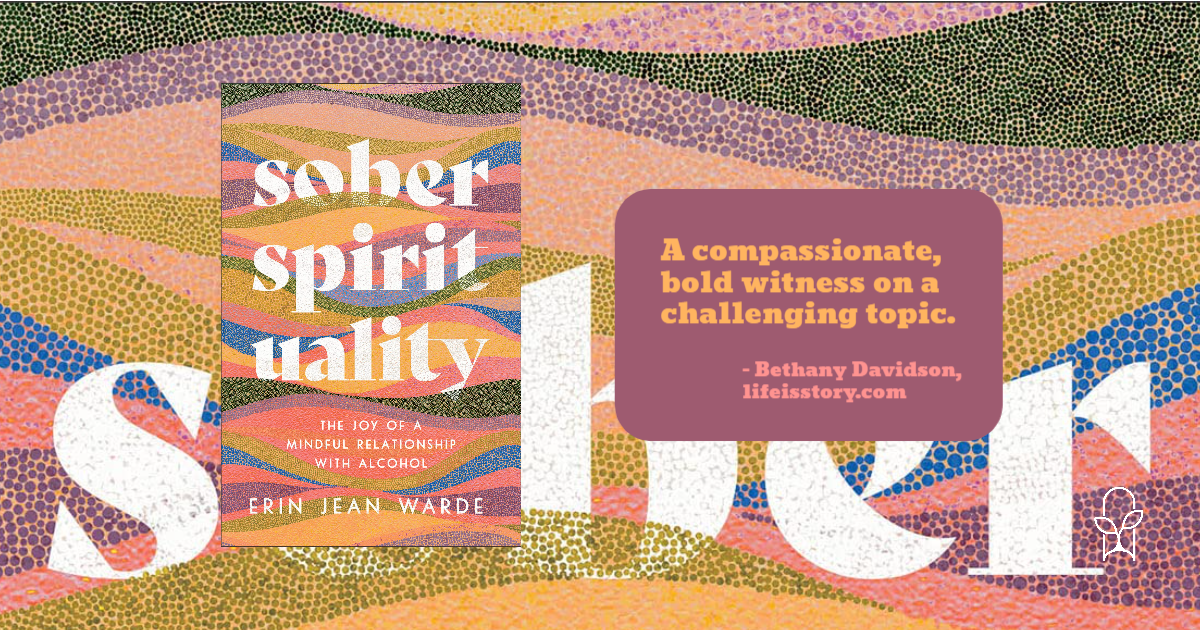
Published by Brazos Press on April 18, 2023
Genres: Non-Fiction, Christian Life, Memoir, Social Justice
Goodreads

When author and Episcopal priest Erin Jean Warde quit drinking, she heard from many others in a similar situation seeking support. In Sober Spirituality, she combines personal storytelling with theological reflection to offer encouragement, wisdom, and practical insight for readers who want to reexamine their relationship with alcohol.
Warde explores the way our culture promotes alcohol consumption and shows how we can choose to change our perception of alcohol in our spiritual communities. She names not only the challenges of sobriety and spirituality but also the tremendous gifts and blessings that come through quitting drinking or being more mindful about alcohol use.
Readers will emerge with a deeper understanding of how their faith informs daily habits and choices. Sober Spirituality also calls the church to a better understanding of how it can ally with recovery communities. Ultimately, this book declares we are all worthy of an abundant and joyful life in mind, body, and soul.
In Sober Spirituality, Erin Jean Warde shares her perspective as an Episcopal priest with a former alcohol problem, explaining how struggled to change her relationship with alcohol because of the drinking culture in her church and denomination. She writes about how harmful alcohol-related cultural norms and expectations are, both in society at large and within progressive churches, and she shares stark realities about alcohol that few people are aware of due to cultural discomfort, the desire to justify drinking, and the alcohol industry’s influence at all levels of society, including government-funded research projects.
When she began her sobriety journey, Warde hoped that God would let her keep it private, but thankfully, that didn’t work out. She shares her personal experience here without oversharing, and she informs the reader about the depths of deception and harm in the alcohol industry, the effects of alcohol, and ways that people can change their relationship to alcohol to live better lives. Warde doesn’t shame people who drink, but she celebrates the wonders of sobriety, making it clear just how much she missed out on for years by living in an alcohol-induced haze.
She also writes about how even though people often turn to alcohol to numb out from trauma, alcohol usage itself often traps people in a state of trauma due to its effect on the brain and body and the various consequences that follow from drinking to excess. I wish that Warde had mentioned generational cycles of alcohol dependency, with people suffering from alcohol-fueled abuse at home and then becoming addicted as well, but she covers many other relevant dynamics.
Powerful Truth-Telling
Warde shares hard truths without being harsh, and she encourages the “sober curious” to discover a better life and a better version of themselves by changing their relationship with alcohol, regardless whether they choose total abstinence or not. Warde challenges common myths about giving up drinking, and she shares a powerful message of compassion for people who suffer. I wish that her talk about self-forgiveness and self-compassion had been balanced out by more talk about forgiveness from God, but I loved her representation of the prodigal son story.
Warde writes that when she decided to become sober, she was afraid to tell people because drinking felt like a requirement in her church. It was like a badge of honor to show that you’re cool, fun, and not a fundamentalist. She calls out ways that progressive church communities harm others by caring more about alcohol than the destruction it unleashes in people’s lives, and she addresses specific counterarguments that Christians often bring up, such as the role of alcohol in the Bible. After explaining how alcohol in Bible times was different in both its content and cultural context, she also unpacks the timeless warnings of Proverbs 23 against drunkenness. She encourages churches that use wine as part of communion to avoid irreverent jokes and to provide non-alcoholic alternatives, just as they might offer gluten-free communication wafers.
This book is definitely intended for Christians, and not just because of the church-related advice. Warde writes a lot about death and resurrection, God’s love, and spiritual healing, but she rarely unpacks what this means. People who aren’t Christians can still benefit from this book, due to the author’s compassionate, non-shaming spirit and highly readable presentation of important information, but they should be aware of how pervasive Christian language and concepts are throughout the book.
Conclusion
Sober Spirituality: The Joy of a Mindful Relationship with Alcohol will appeal to people who are struggling with drinking and want to change, and to those who want to change the discourse around drinking in their environment. Although Warde writes from a very different denominational perspective from mine, people in my denomination have often moved towards permissive attitudes about drinking to distance themselves from their legalistic forebears. One thing this book indirectly challenged me on was to stop using my health issues and dietary restrictions as a way to deflect discussion about me not drinking, when I would rather just say that alcohol is trauma-inflicting poison, and that I do not want to put anything that toxic into my body or support such a predatory industry. This book helped empower me again to say what I really think, instead of feeling like I have to focus on not offending people.
I would encourage Christians to read this regardless of their denomination. Warde directs this to people who share her background in theologically and socially liberal churches, but people with different beliefs and convictions on other issues can filter out the parts that aren’t relevant to them and gain tremendous encouragement and wisdom related to thinking rightly about alcohol, changing one’s own drinking habits when necessary, and supporting people who struggle with addiction in ways that will help them find freedom and spiritual healing. This book is unique and powerful, and I am thankful for the author’s emphatic witness on such a challenging topic.
